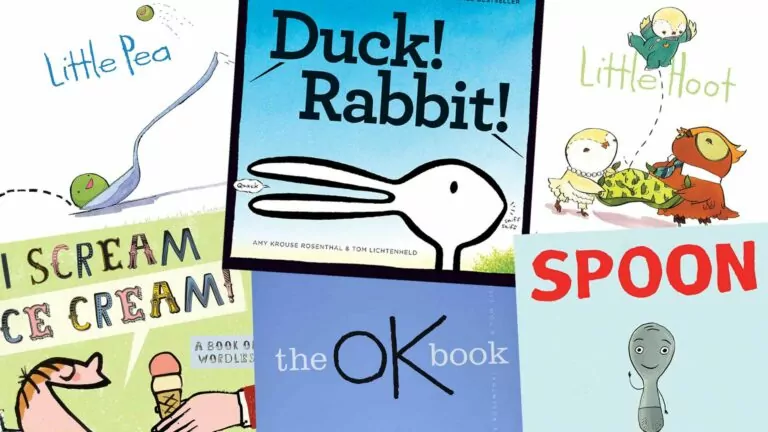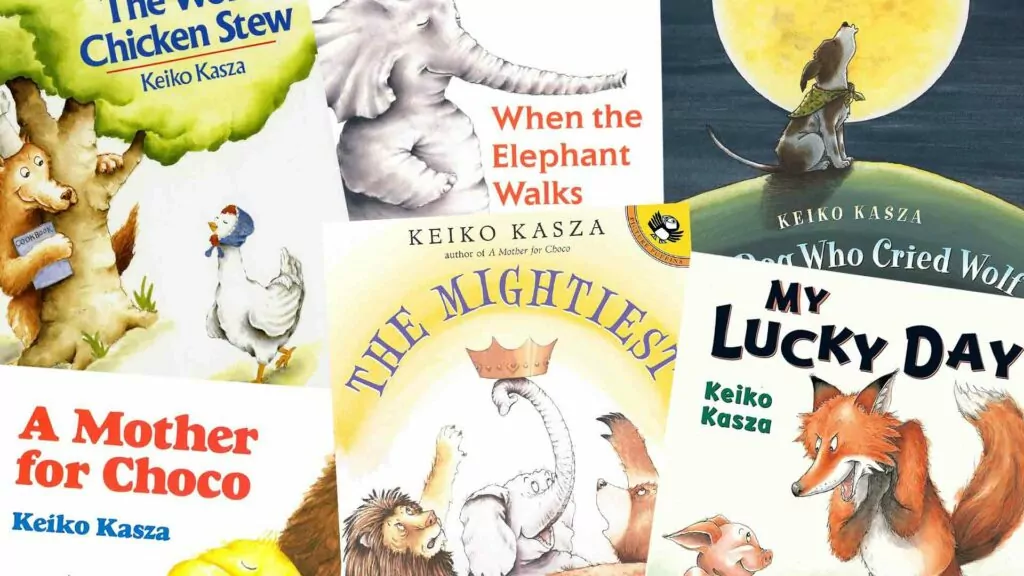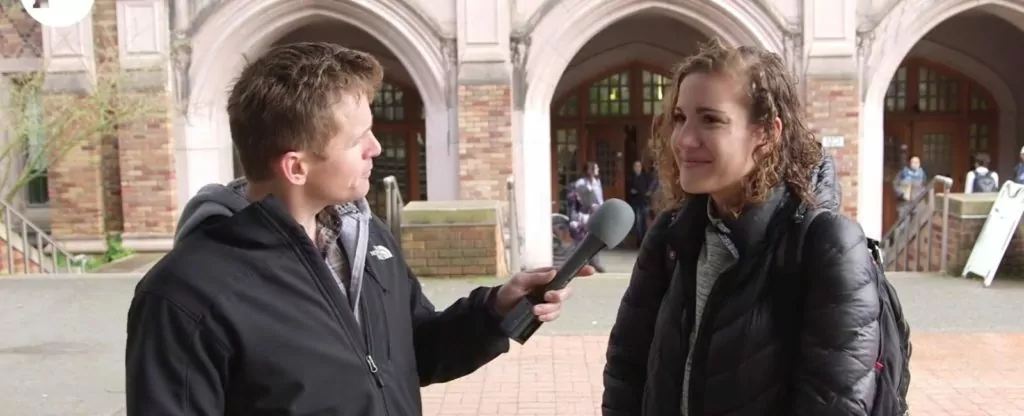Amy Krouse Rosenthal (1965-2017) was a prolific children’s picture book author, crafting more than 30 in just a dozen years. Together with illustrator Tom Lichtenheld, who worked with her at least a dozen times, they were called the “Ginger Rogers and Fred Astaire of children’s literature.”
But that wasn’t Rosenthal’s only outlet: she made quirky videos, adult books, and, after getting diagnosed with terminal cancer, tried to get her husband a new wife, by publishing an essay, “You May Want to Marry My Husband,” in the New York Times just ten days before she died.
While she might be best known for her series of unicorn books, I was impressed by what else she had to offer. I’ve ordered them below from my most to least favorite.
RECOMMENDED (19)
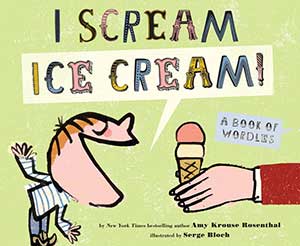 I Scream! Ice Cream!: A Book of Wordles
I Scream! Ice Cream!: A Book of Wordles
2014 /40 pages
What are wordles, you might ask? They are, as this book explains, “groups of words that sound exactly the same but mean different things,” like “I scream” and “Ice cream.” In each instance that follows the first wordle is presented, and then the reader can guess what the soundalike will be, before turning the page to find out. Super fun!
Little Miss Big Sis
2015 / 40 pages
With just a half dozen words each page, but loads of rhymes, this is a wonderful early reader about the arrival of a new baby in the family, and how his (or her?) Big Sis is ready to step up. Could be a good one to read to prep a Big Sis-to-be.
Little Pea (3)
2005 / 30 pages
This is the one that started it all, about a little pea that loved to roll, and play with his dad, and hear stories from his mama about what it was like when she was a little pea. But there was one thing he hated: candy. He absolutely hated eating it, but, in a fun, silly twist, if you want to grow up to be a big strong pea, you have to finish all your candy. And his stern parents won’t let him have any dessert until he has at least five pieces of candy first. What’s for dessert? Pea’s favorite: spinach! What a great joke for a pint-sized audience! A sequel, Little Hoot (2009 / 32 pages) plays on this same reversal theme, with a young owl desperately wishing he could go to bed early. But in his house, the rule is, you have to stay up late, because that’s what owls do! The third and last in the series, Little Oink (2009 / 32 pages) has a piglet just wishing he could clean up his room, but his parents need him to keep it messy because, after all, they are pigs! All three are available as picture books and also as a board book set.
Spoon (3)
2009 / 40 pages
 Little Spoon is a part of a very big spoon family, and at bedtime he likes nothing better than to hear “the story about his adventurous great-grandmother, who fell in love with a dish and ran off to a distant land.” But Spoon is a bit jealous of his friends, Knife and Fork, who seem to live more exciting lives. “Knife is so lucky! He gets to cut, he gets to spread. I never get to cut or spread.” Mom Spoon agrees Knife is pretty “spiffy” that way, and Fork, and the Chopsticks too, all “are something else, aren’t they?” But it turns out his friends think Spoon is pretty lucky too, for the fun he can have banging on pots, measuring stuff, and diving headfirst into a bowl of ice cream. It’s a wonderful, creative lesson, in appreciating both your friends, and all they can do, but appreciating the abilities and opportunities you’ve been blessed with too. Two sequels are also fun. Chopsticks (2012 / 40 pages) is an inventive tale about how the two of them always work in tandem, until the day one of them breaks and, after a quick surgical intervention by the Glue Bottle, Chopstick #2 has to take some time off to recover. Then Chopstick #1 has to figure out how to contribute on his own. Then, in Straw (2020 / 48 pages), a bendy straw learns that being first isn’t always the most important thing. Sometimes, instead of slurping things right up, it’s nice to take it slow and savor.
Little Spoon is a part of a very big spoon family, and at bedtime he likes nothing better than to hear “the story about his adventurous great-grandmother, who fell in love with a dish and ran off to a distant land.” But Spoon is a bit jealous of his friends, Knife and Fork, who seem to live more exciting lives. “Knife is so lucky! He gets to cut, he gets to spread. I never get to cut or spread.” Mom Spoon agrees Knife is pretty “spiffy” that way, and Fork, and the Chopsticks too, all “are something else, aren’t they?” But it turns out his friends think Spoon is pretty lucky too, for the fun he can have banging on pots, measuring stuff, and diving headfirst into a bowl of ice cream. It’s a wonderful, creative lesson, in appreciating both your friends, and all they can do, but appreciating the abilities and opportunities you’ve been blessed with too. Two sequels are also fun. Chopsticks (2012 / 40 pages) is an inventive tale about how the two of them always work in tandem, until the day one of them breaks and, after a quick surgical intervention by the Glue Bottle, Chopstick #2 has to take some time off to recover. Then Chopstick #1 has to figure out how to contribute on his own. Then, in Straw (2020 / 48 pages), a bendy straw learns that being first isn’t always the most important thing. Sometimes, instead of slurping things right up, it’s nice to take it slow and savor.
This Plus That
2011 / 40 pages
Some great math problems in this one, with equations like “1 + 1 = us” and “somersaults + somersaults + somersaults = dizzy.” There’s also some fun pairs, like, “chalk + sitting = school” versus “chalk + jumping = hopscotch.” I read this to my kids as a guessing game: I didn’t show them the pictures, but just read the equations and paused on some of them to give them a chance to provide the answer. I’ll sometimes make additions to stories as I read them (just to mix things up and keep myself engaged) so when I read “blaming + eye rolling ≠ sincere apology” one daughter asked if I had made an insertion. But nope, it’s in the book! Very fun!
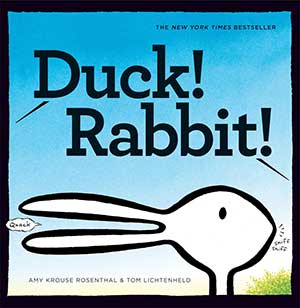 Duck! Rabbit!
Duck! Rabbit!
2009 / 32 pages
Is it a duck, or is it a rabbit? A back and forth debate is more entertaining than I thought it could be, with the two sides each making a series of pretty compelling points. I wonder if this might be something to inspire a kid to take up drawing, as they see that a picture doesn’t even have to be clearly one thing or the other to make it into a picture book!
Cookies: Bite-Size Life Lessons (3)
2005 / 40 pages
This is part dictionary, part cookbook, and part lessons for life. Each page begins with a picture of a child taking on some baking task, often helped by a fully-dressed dog, rabbit, frog, or kitten. I’m guessing those might be their stuffies, come to life to give an assist. Each page also starts with a word, and the definition is then the lesson. For example: “Modest means you don’t run around telling everyone you make the best cookies, even if you know it to be true.” And: “Greedy means taking all the cookies for myself.” Each page is worth a pause to consider. And the book ends (of course!) with a chocolate chip cookie recipe. Two sequels, Sugar Cookies: Sweet Little Lessons on Love (2010 / 40 pages) and One Smart Cookie: Bite-Size Life Lessons for the School Years and Beyond (2010 / 40 pages), are every bit as nice, though there is a bit of repetition from one book to the next.
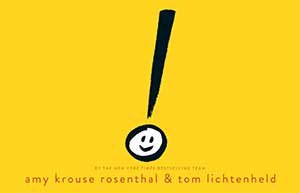 Exclamation Mark!
Exclamation Mark!
2013 / 56 pages
An exclamation mark doesn’t fit in with all the periods around him. But when he meets a question mark, he realizes that standing out isn’t a bad thing. And he has a special talent for making things exciting! A great book to get kids excited about punctuation!
Choo-Choo School
2020 / 34 pages
What kind of puns can you come up with if you pretend a train full of cars were actually kids heading to school? Well, the Conductor would lead music class, of course. And the Diner car would make a joke during lunch about how they were now a “chew-chew choo-choo train.” Lots more humor that First Graders will appreciate.
Friendshape
2015 / 40 pages
A square, circle, triangle, and rectangle share lessons about getting along with folks who are a bit different from us.
I Wish You More
2015/ 40 pages
This is a book of wishes: “I wish you more ups than downs,” “I wish you more give than take,” and “I wish you more will than hill.” The weakness of the book is that it is secular so these wishes, however well-meant, are just sent out into the air. But that doesn’t mean the book can’t serve as some good inspiration for Christians on what we can bring to our God regarding our friends and neighbors.
the OK book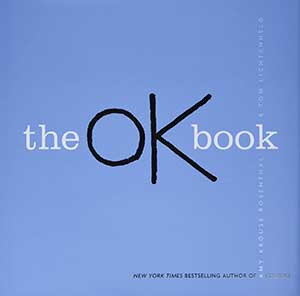
2007 / 36 pages
The gimmick here is that if you turn the world “OK” sideways it can look like a stick person. From page to page we see this “okay” person (boy? girl? it’s not clear, and doesn’t really matter) explaining how, while they like to try a lot of different things, “I’m not great at all of them, but I enjoy them just the same.” It’s an encouragement to enjoy doing, even when you aren’t all that good, just because that’s fun, and in part because that’s how you’ll find out what you are good at.
On the Spot
2017 / 32 pages
Reusable stickers can be placed in specific spots throughout the book to change the story. So, for example, a child could place a pig in a certain spot so an old favorite nursery rhyme now goes, “Twinkle, twinkle, little pig…” As my daughter put it, it’s kind of a reusable Mad-Lib. So, a fun book, but those reusable stickers would get quickly lost in a school library setting. That means this could make for a good gift, but not a good school purchase.
TAKE IT OR LEAVE IT
Christmas Cookies: Bite-Size Holiday Lessons
2008 / 40 pages
A sequel to her Cookies: Bite-Size Lessons for Life, recommended above, this is more of the same, with a Christmas cookie recipe in the back instead. The reason it got bumped down to “Take It or Leave It” is its handling of Santa. The definition reads, “Believe means I might never see it happen, but he will come and eat [the cookies I laid out]. I just know it.” I’m not a big fan of encouraging our kids to believe in a never-seen, amazingly powerful entity that knows when you’ve been bad or good, but who is not God, but made up. I think that would quite logically breed distrust when we would later reveal that, no, Santa isn’t actually real… but God still is. It’s only one of the 40 pages (or sort of two) so it’s not a big deal, especially if your kids already know Santa isn’t real.
Yes Day!
2009 / 40 pages
On one day of the year, this boy’s parents have agreed to say yes to whatever he ask. Pizza for breakfast? Yes. Can I clean my room tomorrow instead? Yes. Can we get ice cream? Yes indeed. Even when the boy asks if they can have a food fight, his parents say yes (though they take it outside). Aside from the food fight, the requests here are of a modest sort (staying up late, piggyback, etc.) so the only reason this got bumped down here is that this could inspire some kids to think they should have a yes day too, but with less reasonable requests. It’s still a fun read, and I think parents might be inspired to, every now and again (and maybe without even telling your kids) set aside a day in which you and your spouse agree to grant every reasonable request your kids ask. Could be interesting!
The Wonder Book
2010 / 80 pages
All sorts of amazing poems, palindromes, and short stories fill page after page. The only reason it got bumped down here is that there is an instance of potty humor (“Tinkle, Tinkle, in the sea. Don’t look under while I pee.”) and a weird Dracula-looking kid shows up a couple of times. A couple more reasons to check it out include a great poem about brats, and all those palindromes.
Moo-Moo, I Love You!
2020 /40 pages
A cow explains that her love for you is as big as a “moo-se.” A couple dozen more moo jokes fill out the book. It is funny, but the humor is repetitive, making it one of those books that I sure wouldn’t want to have to read again and again.
Plant a Kiss
2011 / 36 pages
A girl plants a kiss and when a strange and wonderful tree-like thing sprouts, she is willing to share its fruit with everyone. You might think that sharing the fruit of a kissing tree might involve some actual kissing. But nope. Only one kiss in this book. An odd one, that I don’t really get (other than the overall message that sharing is caring).
One of Those Days
2006 / 32 pages
If your kid is having “one of those days” days, this might be a book you could read with them. It highlights how all sorts of days are those sorts of days including “your best friend acting like your beast friend day,” “favorite pants too short day” and “annoying sibling day.” With a parent along for the ride, this could be a lesson in empathy and sympathy. Without a parent, reading about all this bad stuff happening might not help, fostering whining rather than seeing difficulties for the small problems they actually are.
Dear Girl
2017 / 40 pages
This a book of encouragements, perhaps intended to be given by a mother to her daughter. Overall, it is pretty good, with insightful thoughts like, “”Find people like you. Find people unlike you.” and “You know what’s really boring? When people say how bored they are.” But one of the encouragements is something I would discourage: “there are no rules about what to wear, or how to cut your hair.” So, one to read with your kid and discuss.
DON’T BOTHER
Bedtime for Mommy takes the same sort of reversal idea we saw in Little Oink, Little Hoot, and Little Pea, but now has a little girl putting her mommy to bed, including getting her bathed. For me, that crosses the line from funny to weird.
Uni the Unicorn knows that little girls are real, no matter what anyone else says. In an age when people really do think that believing can make something so, this idea of a unicorn believing in a girl, and a girl believing in a unicorn, and them being right because they believed so strong, just isn’t an idea I want to pitch to my kids. This original story spawned a whole series (10 more so far) of Uni books, and while the original was at least clever, these others are not.
Al Pha’s Bet is an alphabet book, and while a little less boring than most such books, is boring still. It also has “Al Pha” repeatedly saying “Gee” as he names the seventh letter in the alphabet. Awake Beautiful Child is sort of an alphabet book too, though it focuses on only the first three letters. The three words on each page begin with A, then B, and finally C, as in “All begins cheerily” and “Amusing breakfast chatter.” An odd artistic style doesn’t improve things.
Page after page of lame moo jokes aren’t reason enough to overlook the problematic title of Holy Cow, I Sure Do Love You! And a staring contest with an owl isn’t reason enough to overlook minced oaths like “Dang” and “Jeepers” in Don’t Blink!
There is no “d9” it, Wumbers is very clever, with words “cre8ed” with numbers. But two pages of clueless angels, sitting on clouds wondering where they are (“I think it is 7” says one, to which the other replies, “I suppose it is our f8”) pitches the popular and wrong notion that people become angels when we die.
That’s Me Loving You promises something to a child that isn’t true: that their loved ones will never really be far from them. “That shimmering star? That’s me winking at you.” “That inviting ocean? That’s me waving at you.” This notion directs kids to look to their imagination for what only God can give them. God actually is everywhere they go, and He can always be right nearby. So this book misdirects kids.
It’s Not Fair is just one whine after another. Some of them are funny whines – “Why can’t books go on and on? No more endings, only Once Upons…” – but these whines end with “It’s not fair.” There aren’t many kids who’d benefit from hearing or reading “It’s not fair” a dozen times.







